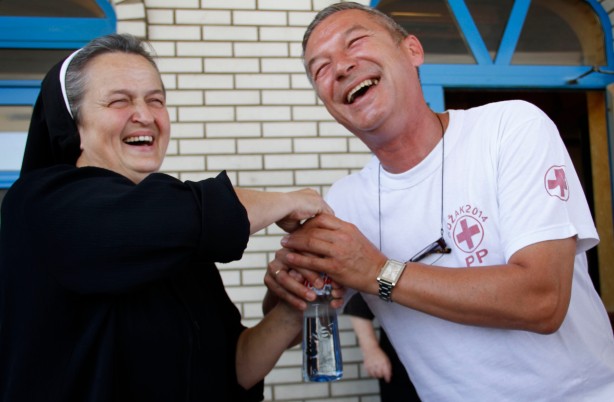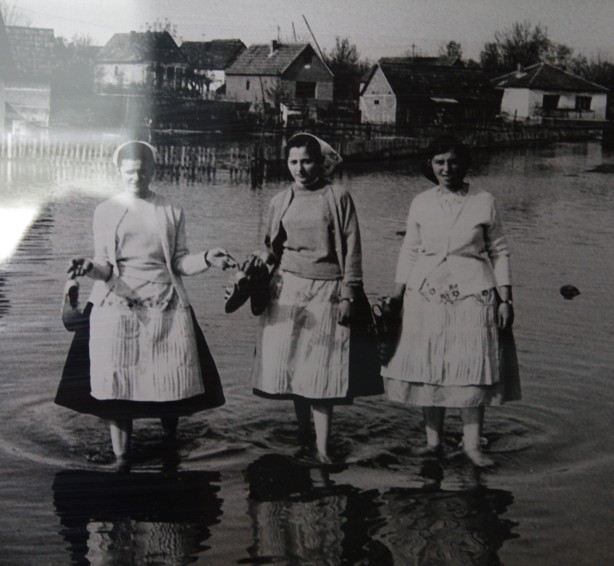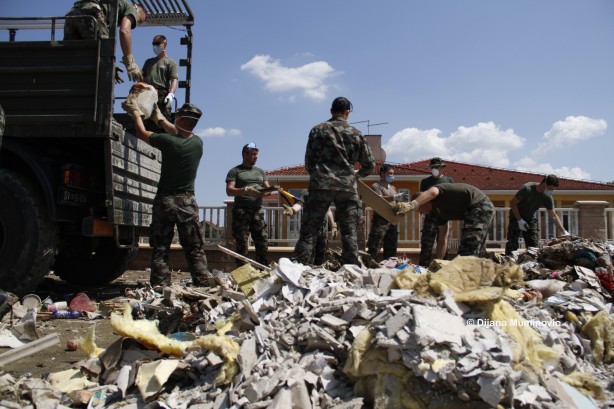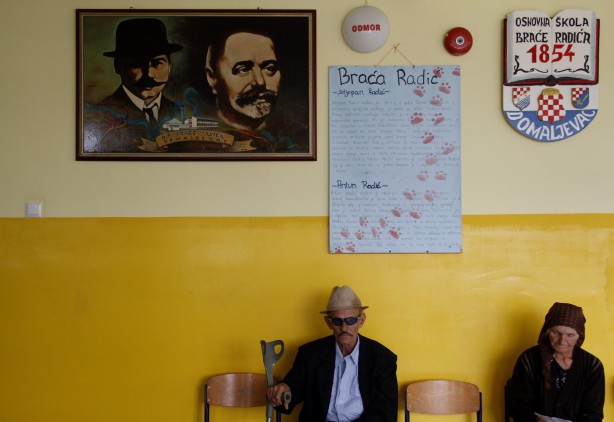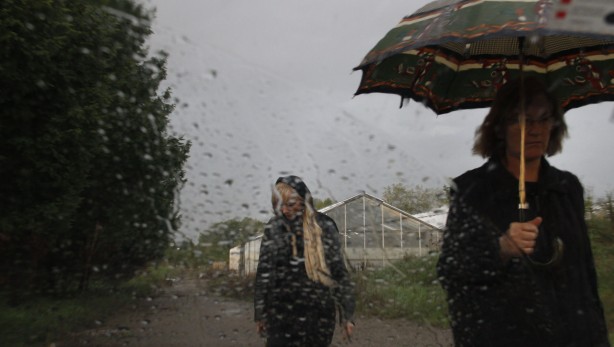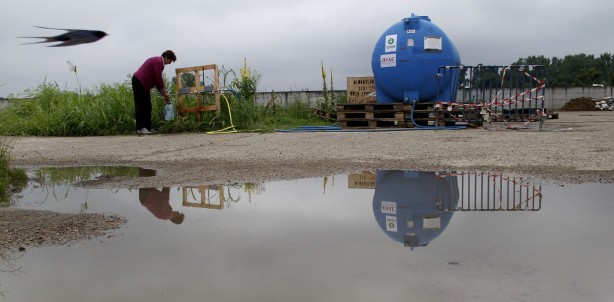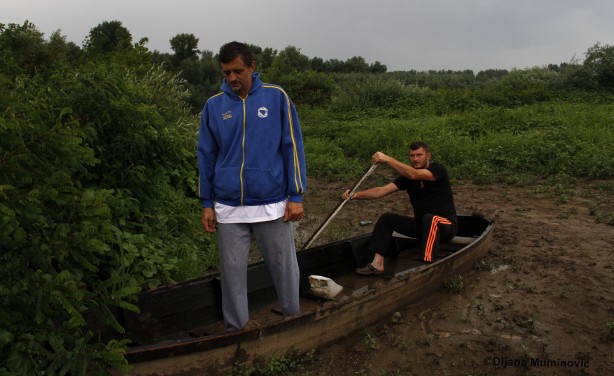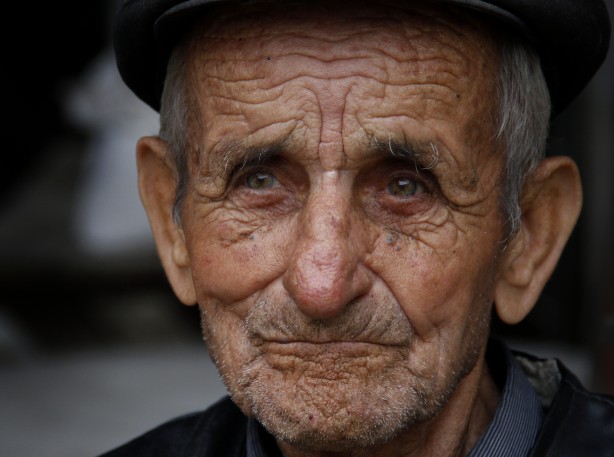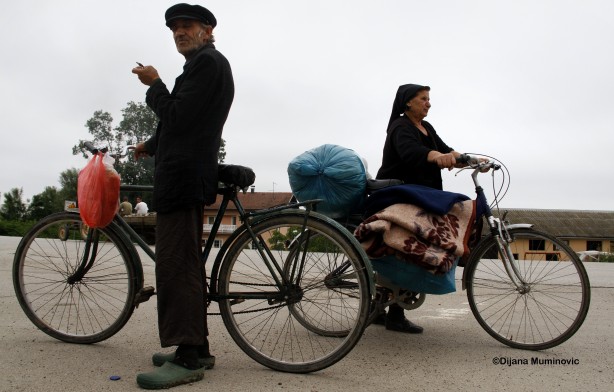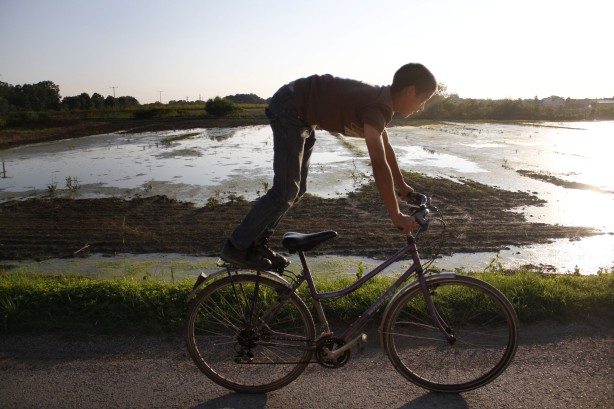I am entering Bosnia with a rainbow over the small town, thankful to be here as a photojournalist after weeks of collecting donations. My cousin is correcting me how to pronounce Domaljevac, as I’ve never heard of it before. Dr. Larisa Gavran from Zenica recommended I visit their health institution because my group from Kentucky and I planned to ship medical supplies to clinics. So I rushed to Domaljevac because it was the nearest from the airport, and the flood stayed there for 20 days. Then I learned how in 70s, the water stayed for 6 months, and therefore its name: Dom, meaning home, and ljevac, referring to water flowing. Soon, home of the floods became my home too.
Miron picked me up, the Red Cross director in Domaljevac, and in my boots and a mask, I observed what seemed to be an empty town. Then I asked Miron if he knew Dr. Samir Karabegovic. He looked at me and drove me straight to his house from where we called the main office in Bosnia to send a request to the Red Cross in DC. And when I was leaving, with eyes full of tears, Dr. Samir told me, “You don’t know how much it means when someone visits us…more than any donation..” We left and passed by the clinic. The water left a mark on the white walls. The water also left patients without a proper medical treatment; doc was treating them in an elementary school. Then I was taken to Pauk, a local hotel with a small bar inside, or a place where everything was happening. Dr. Samir introduced me to Kristina Pejic, and with her handwritten name tag that specified her as a chemist and a coordinator for pure water, I thought all this was a joke; like I was reading a book by war correspondents in 90s…And to add to this feeling, a young man called my name. He must be joking, I thought. But he said four years ago he asked me to buy him cigarettes in Srebrenica, and that I refused.
Then Sister Jela sparked us with her presence. Doctor jokingly asked if she was drinking moonshine. Domaljevac was full of good energy and hardworking people who had no time to think how the disaster swept away the town, and sent its first flood refugees to Austria and Germany. Elderly that stayed were cleaning houses and streets, and no one was complaining. “We cry for few minutes. But soon it passes when we see how many people arrived to help us clean. That keeps us going,” said Sister Jela.
I saw what actually had happened in Bosnia, soon Serbia and Croatia: the water broke borders, connected people and in a still ethnically divided country, the humanity prevailed. Dr. Samir, Bosnian Muslim, saved the town from the epidemics; he figured out how to save those from other towns (in Republic of Srpska entity) because they had to receive the hemodialysis that wasn’t available during the flood. Kristina was all over the place, translating for every foreigner that entered the town. She made sure the town received the pure water, filters, and that later the wells were tested. Together with the Austrian Army and Austrian Red Cross, she made it all happen. Miron drove from place to place, delivering aid, answering calls, and organizing all he could. Other local women like Marijana, cooked, and gathered other people to help. Kids cleaned the road and Sister Jela encouraged and spoke to everyone she could, and no one was left behind in this town. The Muslim Macedonian family that own the ice cream shop, helped evacuate people, and last thought on anyone’s mind was ethnicity. And when I met Nada, a local photographer who gave me all the photographs during the flood, she said, “Take them all, as if you’ve been here..”
It was then I realized I stood in front of many heroes. All working to save the town from dying, and at their own risk and cost before any governmental help arrived. But each one of them had a story of their own too: Kristina’s Mom told me of her dear younger daughter who died, and Kristina’s greenhouse business completely destroyed in the flood, and Kristina’s father battling with Parkinson’s, but still managing to locate every well and detail needed to make the water flow or prevent from entering the Hotel—the place that soon became home to everyone who lived in Domaljevac or came to help. It was my place too, room 103. I watched the “Blue Elephant” the big water tank of pure water through my window being visited by elderly women in traditional clothes on a bike…
Even in a town 10 miles from Domaljevac, Bosanski Samac, in Republic of Srpska, the young men, Emir and Senad (Bosnian Muslims), and their best friend, Teodor (Bosnian Serb), all lived on a canoe, saving people. But the towns are still recovering. People are still hoping for a better tomorrow. There is a big need for jobs, and if not invested in them, Bosnian towns could soon become ghost towns, and our country’s population will be tremendously declined. Unfortunately, the Diaspora will need to hold together too and continue supporting our motherland, as this problem will not be solved soon. My group of friends from Kentucky and I, hope to become an official society that will continue helping Bosnia and Herzegovina. Just few days go, we decided that 40% of our funds we raised in Kentucky get donated to Domaljevac’s health institution, who will share some of their aid with clinic in Maglaj. As we were unable to ship medical supplied due to border restrictions, we decided to donate money directly.
And I couldn’t have arrived to a better place. What Domaljevac gave me in a month and a half was Bosnia in solidarity we all dream of, and I lived it.
Now that I’m leaving this town, unfortunately going to document more floods, but at least I am leaving in peace, knowing our small donation will help them move forward. And as always, I am more thankful and happy that I met these people who make this world better a better place.

